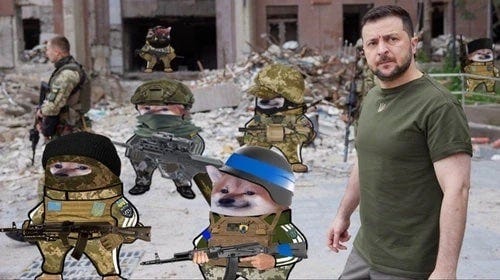The Perfection Trap
How Western Double Standards Undermine Ukraine (and Help Russia)
There's an absurd paradox playing out in Western capitals and newsrooms. On one hand, Ukraine is expected to become Sweden overnight—perfect governance, zero corruption, flawless democracy—even while fighting a devastating war. On the other hand, those same Western governments and media often conveniently overlook, downplay, or entirely ignore severe corruption within their own countries or even within the European Union.
This demand for perfection isn't just unfair—it's dangerously counterproductive. Worse, it's being actively weaponised by Russia.
🎯 The Illusion of Moral Consistency
Corruption undeniably exists in Ukraine. But the country's response has been extraordinary, given the context. Amid relentless missile strikes and frontline battles, President Zelensky's government has dismissed corrupt officials, strengthened transparency, and pursued judicial reforms. Yet, Ukraine is still scolded publicly by Western leaders and institutions, held to a standard so high it borders on impossible.
Meanwhile, Western governments hand billions to authoritarian Gulf monarchies, remain entangled in lobbying scandals, and look the other way when convenient. Why the hypocrisy?
🔥 Journalistic Double Standards: Moralistic Clickbait
Journalists—often well-meaning—unwittingly feed this cycle. Reporting fatigue has set in. Heroic tales of Ukrainian resilience no longer drive traffic, but "corruption scandals" do. Headlines emphasizing negative narratives get clicks, but they also feed directly into Kremlin propaganda:
Western journalists strive for "balance," inadvertently amplifying minor scandals as if they're major state failures.
Kremlin media seizes these stories, recycling them as "proof" that even Ukraine’s allies believe it's a failed state.
This creates a cycle where Ukraine is repeatedly put under a harsh spotlight, reinforcing negative stereotypes.
🧩 Meanwhile, Within the EU: Orbán and Fico Get a Pass
While Ukraine faces impossible scrutiny, EU leaders like Hungary's Viktor Orbán and Slovakia's Robert Fico operate freely despite actively undermining European unity:
Viktor Orbán openly sympathizes with Putin, systematically dismantles judicial independence, manipulates the media, and misappropriates EU funds. Yet, billions in EU funding continue flowing into Hungary.
Robert Fico returned to power in Slovakia on an openly pro-Russian, anti-Ukrainian platform. He’s sabotaged aid, spread Kremlin narratives, and targeted independent institutions. Yet, Slovakia remains a fully integrated EU member.
Where’s the EU's conditionality for them? Why aren't Western media obsessed with Orbán’s corruption or Fico’s Russian ties?
📌 The Structural Reasons Behind the Double Standard
Strategic Cynicism:
Western nations tolerate internal corruption or authoritarian-leaning allies because it suits geopolitical or economic interests.Fear of Internal Confrontation:
Orbán and Fico can retaliate politically within the EU, exercising vetoes or damaging unity. Ukraine lacks such leverage.Convenient Scapegoat:
When Western leaders face domestic political pressure, Ukraine’s imperfections become an easy excuse to slow aid, appease populists, or divert attention from internal failings.
🚩 Russia's Propaganda Jackpot
The Kremlin couldn't design a better propaganda machine:
Reflexive Control: Russia weaponizes Western critiques to sow doubt in Ukraine’s legitimacy and resilience.
Moral Equivalence: By highlighting Ukrainian flaws amplified by Western media, Russia creates a "both sides are corrupt" narrative, eroding moral clarity.
Wedge Driving: Russia leverages these narratives to erode trust between Ukraine and its allies, dampening public support in Western democracies.
⚠️ Breaking the Cycle
To reverse this, Western governments and media must:
Provide context around Ukraine’s reforms instead of sensationalizing every misstep.
Apply equal scrutiny to internal corruption and problematic EU members.
Recognize and counteract Russian narrative strategies.
If not addressed, this perfection trap risks eroding the solidarity Ukraine critically needs to win this war.
💡 Final Thought
Ukraine’s survival and eventual victory depend as much on narrative clarity as on military aid. If Western allies don't recalibrate their approach—acknowledging Ukraine’s remarkable progress rather than unfairly demanding perfection—they risk handing Moscow an unearned victory.
Because in modern warfare, narratives matter—and right now, the West is dangerously close to scoring an own goal.




I agree with your summary and that it is unreasonable to expect Ukraine to achieve perfection which cannot be achieved by any country, even Sweden. One of the great advantages of a good man like President Zelenski, is that he is instantly recognised wherever he goes. That, in itself, may be seen as a form of corruption by undue influence. However, for a country under existential attack it is an essential ingredient for survival. It is not time to lose that advantage. He will have had quite enough when Ukraine wins and he will deserve a rest.